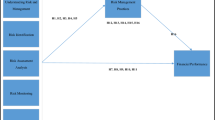Abstract
The inability to handle financial risk as well as the possession of unhelpful financial risk attitudes by most bank customers poses considerable challenges to the banking sector. An individual customer who finds it difficult to handle significant decline in the value of their portfolio might resort to suicide or other negative life-threatening acts as means of ending their financial grief. Thus, it is important that customers are assisted to learn how to handle risks and/or losses related to their portfolio. This study investigated whether REBT-based business coaching can improve financial risk tolerance and financial risk attitudes among commercial bank customers in Nigeria. In this study which employed a two-group random assignment pretest–posttest design, 64 participants stayed in the REBT-based business coaching group whereas 63 participants stayed in the control group throughout the study period. The coaching program consisted of 8-weeks coaching activities. Quantitative data was collected before and immediately after the coaching program as well as 3-months later using measures of financial risk tolerance and financial risk attitudes. From the results, it was shown that REBT-based business coaching significantly improved the financial risk tolerance [F(1, 124) = 521.996, p < 0.05, η2p = 0.81] and financial risk attitudes [F(1, 124) = 582.613,p < 0.05, η2p = 0.83] of the commercial bank customers. Analysis of follow-up data revealed that these positive improvements were significantly sustained by study participants who received the REBT-based business coaching (financial risk tolerance [F(1, 126) = 339.492, p < 0.05, η2p = 0.73, \(\mathop {\Delta R}\nolimits^{2}\) = 0.767] and financial risk attitudes [F(1, 126) = 378.505, p < 0.05, η2p = 0.76, \(\mathop {\Delta R}\nolimits^{2}\) = 0.758]). Therefore, the REBT-based business coaching showed promising results by improving the financial risk tolerance and financial risk attitudes of bank customers. Large-scale coaching program based on REBT-based business coaching model can be deployed to reduce negative risk attitudes towards investment among other group of individuals in this and other study areas.


Similar content being viewed by others
Data availability
Available from the corresponding author on reasonable request.
References
Amalia, P., & Ionut, P. (2009). Consumers’ reaction and organizational response in crisis context. Annals of Faculty of Economics, University of Oradea, Faculty of Economics, 4(1), 779–782.
Certified Financial Planner Board. (2004). CFP Board Topic List for CFP. Certification Examination. Retrieved May 18 2019, from http://www.cfp.net/downloads/guide_FPTopics.pdf
Cohen, L., Manion, L., & Morrison, K. (2007). Research methods in education (6th ed.). Routledge/Taylor & Francis Group.
Cordell, D. M. (2002). Risk tolerance in two dimensions. Journal of Financial Planning, 15(5), 30–35.
David, O. A., & Cobeanu, O. (2015). Evidence-based training in cognitive behavioural coaching: Can personal development bring less distress and better performance? British Journal of Guidance & Counselling, 44(1), 12–25.
David, O. A., Ioana, I., Adriana, C. I., & Florin, A. S. (2016). Coaching banking managers through the financial crisis: Effects on stress, resilience, and performance. Journal of Rational-Emotive and Cognitive-Behavior Therapy, 34(4), 267–281.
David, O. A., & Matu, S. A. (2013). How to tell if managers are good coaches and how to help them improve during adversity? The managerial coaching assessment system and the rational managerial coaching program. Journal of Cognitive and Behavioral Psychotherapies, 13(2), 497–502.
Donkers, B., Melenberg, B., & Van Soest, A. (2001). Estimating risk attitudes using lotteries: A large sample approach. Journal of Risk and Uncertainty, 22(2), 165–195.
Eseadi, C., Mabel, A., Obidoa, A. M., Ogbuabor, E. S., & Ikechukwu-Ilomuanya, B. A. (2017a). Effects of group-focused cognitive-behavioral coaching program on depressive symptoms in a sample of inmates in a Nigerian prison. International Journal of Offender Therapy and Comparative Criminology, 62(6), 1589–1602.
Eseadi, C., Onwuka, G. T., Otu, M. S., Umoke, P. C. I., Onyechi, K. C. N., Okere, A. U., & Edeh, N. C. (2017b). Effects of rational emotive cognitive behavioral coaching on depression among type 2 diabetic inpatients. Journal of Rational-Emotive and Cognitive-Behavior Therapy, 35, 363–382.
Fan, J. X., & Xiao, J. J. (2006). Cross-cultural differences in risk tolerance: A comparison between Chinese and Americans. Journal of Personal Finance, 5(3), 54–75.
Faul, F., Erdfelder, E., Lang, A.-G., & Buchner, A. (2007). G*Power 3: A flexible statistical power analysis program for the social, behavioral, and biomedical sciences. Behavior Research Methods, 39, 175–191.
Ganzach, Y., Ellis, S., Pazy, A., & Ricci-Siag, T. (2008). On the perception and operationalization of risk perception. Judgment and Decision Making, 3(4), 317–324.
Gilliam, J., Chatterjee, S., & Grable, J. (2010). Measuring the perception of financial risk tolerance: A tale of two measures. Journal of Financial Counseling and Planning, 21(2), 40–53.
Grable, J. E. (2000). Financial risk tolerance and additional factors that affect risk taking in everyday money matters. Journal of Business and Psychology, 14(4), 625–630.
Grant, M. A., & O’Connor, S. A. (2010). The differential effects of solution-focused and problem-focused coaching questions: A pilot study with implications for practice. Industrial and Commercial Training, 42(2), 102–111.
Halek, M., & Eisenhauer, J. G. (2001). Demography of risk aversion. Journal of Risk and Insurance, 68, 1–24.
InvestSmall. (2020).Commercial banks in Nigeria and their functions. Retrieved June 15 2021, from https://www.investsmall.co/functions-of-commercial-banks-in-nigeria/
Keller, C., & Siegrist, M. (2006). Investing in stocks: The influence of financial risk attitude and values-related money and stock market attitudes. Journal of Economic Psychology, 27(2), 285–303.
Kodish, S. P. (2002). Rational emotive behavior coaching. Journal of Rational-Emotive and Cognitive-Behavior Therapy, 20, 235–246.
Lucarelli, C., & Brighetti, G. (Eds.). (2011). Risk tolerance in financial decision making, Palgrave Macmillan studies in banking and financial institutions. Palgrave Macmillan.
Lutter, J. I., Szentes, B., Wacker, M. E., Winter, J., Wichert, S., Peters, A., Holle, R., & Leidl, R. (2019). Are health risk attitude and general risk attitude associated with healthcare utilization, costs and working ability? Results from the German KORA FF4 cohort study. Health Economics Review, 9(1), 26.
Mahfar, M., & Senin, A. A. (2015).Managing stress at workplace using the rational emotive behavioral therapy (REBT) approach. In International Conference on Human Resource Development.
McInish, T. H., Ramaswami, S. N., & Srivastava, R. K. (1993). Do more risk-averse investors have lower net worth and income? The Financial Review, 28(1), 91–106.
Metzger, B. A., & Fehr, R. R. (2018). Measuring financial risk attitude: How to apply both regulatory and scientific criteria to ensure suitability. Journal of Behavioral Finance, 19(2), 221–234.
Murray, D. M. (1997). Design and analysis of group-randomized trials: A review of recent developments. Annals of Epidemiology, 7(7), S69–S77.
Mustafa, M. B., Bistamam, M. N., Jais, S. M., Arip, M. A. S. M., & Salim, S. S. S. (2018). The effect of rational emotive behavior therapy approach module in the conflict management of guidance and counseling teachers in secondary school. International Journal of Academic Research in Business and Social Sciences, 8(4), 923–932.
Nistorescu, T., & Puiu, S. (2009). Marketing strategies used in crisis-study case. MPRA Paper 17743, University Library of Munich, Germany.
Ntamu, B. A. (2017). Effect of rational emotive behavioural therapy on curbing examination malpractice behaviour among public secondary school students in Calabar municipality. International Journal of Scientific Research in Education, 10(4), 440–450.
Otu, M. S. (2020). Effect of rational emotive career coaching on dysfunctional career beliefs, employability skills acquisition and entrepreneurial intention among recent first degree graduates in Enugu State, Nigeria. PhD Thesis. University of Nigeria.
Otu, M. S., & Omeje, J. C. (2021). The effect of rational emotive career coaching on dysfunctional career beliefs in recent university graduates. Journal of Rational-Emotive and Cognitive-Behavior Therapy, 39, 555–577.
Palmer, S., & Szymańska, К. (2007). Cognitive behavioural coaching. An integrative approach. In S. Palmer & A. Whybrow (Eds.), Handbook of coaching psychology. A guide for practitioners (pp. 86–117). Routledge.
Pousa, C., & Mathieu, A. (2015). Is managerial coaching a source of competitive advantage? Promoting employee self-regulation through coaching. Coaching: an International Journal of Theory, Research and Practice, 8(1), 20–35.
Ratiu, L., David, O., & Baban, A. (2017). Developing managerial skills through coaching: Efficacy of a cognitive-behavioral coaching program. Journal of Rational-Emotive Cognitive-Behavior Therapy, 35, 88–110.
ReDahlia, R. (2021). List of commercial banks in Nigeria: Offerings and overview. Retrieved from https://www.entrepreneurs.ng/list-of-commercial-banks-in-nigeria/
Twin, A. (2020). Risk tolerance. Retrieved April 22 2021, from https://www.investopedia.com/terms/r/risktolerance.asp
Weber, E. U. (2010). Risk attitude and preference. Wiley Interdisciplinary Reviews: Cognitive Science, 1(1), 79–88.
Weber, E. U., Blais, A. R., & Betz, N. E. (2002). A domain-specific risk-attitude scale: Measuring risk perceptions and risk behaviors. Journal of Behavioral Decision Making, 15(4), 263–290.
Yao, R., Sharpe, D. L., & Wang, F. (2011). Decomposing the age effect on risk tolerance. Journal of Socio-Economics, 40, 879–887.
Author information
Authors and Affiliations
Corresponding author
Ethics declarations
Conflict of interest
On behalf of all authors, the corresponding author states that there is no conflict of interest.
Additional information
Publisher's Note
Springer Nature remains neutral with regard to jurisdictional claims in published maps and institutional affiliations.
Rights and permissions
About this article
Cite this article
Onyeanu, E.O., Ugwoke, R.O., Ugwoke, O.V. et al. Financial Risk Tolerance and Financial Risk Attitudes of Commercial Bank Customers and the Role of REBT-Based Business Coaching: Implications for Accounting Research. J Rat-Emo Cognitive-Behav Ther 40, 841–856 (2022). https://doi.org/10.1007/s10942-022-00447-1
Accepted:
Published:
Issue Date:
DOI: https://doi.org/10.1007/s10942-022-00447-1




